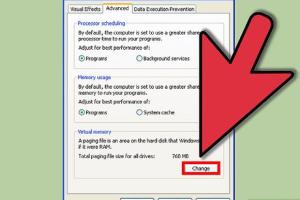Ultimate Guide: Speed Up Your Windows XP Computer in 2023

-
Quick Links:
- Introduction
- Understanding Windows XP
- Common Issues Slowing Down Windows XP
- Step-by-Step Guide to Speeding Up Windows XP
- Advanced Techniques for Optimization
- Case Studies
- Expert Insights
- FAQs
- Conclusion
Introduction
Windows XP, launched in 2001, remains a nostalgic operating system for many users. However, as technology has advanced, users often find their Windows XP computers slowing down. This comprehensive guide will explore practical methods and expert strategies to speed up your Windows XP computer, ensuring it runs smoothly even in today’s digital environment.
Understanding Windows XP
Windows XP was designed to be user-friendly, but its architecture is outdated compared to modern operating systems. Understanding its limitations is key to optimizing performance. The operating system includes several components that can become sluggish over time, such as:
- Fragmented Hard Drives
- Accumulated Temporary Files
- Outdated Drivers
- Excessive Startup Programs
- Malware and Viruses
Common Issues Slowing Down Windows XP
Several common issues contribute to the slow performance of Windows XP:
- Fragmentation: Over time, files become fragmented, causing longer load times.
- Startup Programs: Many applications may start automatically, consuming resources.
- Malware: Viruses and malware can significantly hinder performance.
- Disk Space: Running low on disk space can lead to performance issues.
Step-by-Step Guide to Speeding Up Windows XP
Step 1: Clean Up Your Hard Drive
Start by removing unnecessary files:
- Go to Start > All Programs > Accessories > System Tools > Disk Cleanup.
- Choose the drive you want to clean and follow the prompts.
Step 2: Defragment Your Hard Drive
Defragmenting rearranges fragmented data:
- Access the defragmentation tool via Start > All Programs > Accessories > System Tools > Disk Defragmenter.
- Select the drive and click on Defragment.
Step 3: Disable Unnecessary Startup Programs
Reduce boot time by disabling unnecessary startup programs:
- Press Windows Key + R, type msconfig, and press Enter.
- Go to the Startup tab and uncheck programs you don’t need at startup.
Step 4: Update Drivers
Outdated drivers can lead to performance issues. Visit the manufacturer's website to download the latest drivers for your hardware.
Step 5: Install Antivirus Software
Ensure your system is protected by installing a reputable antivirus program and conducting regular scans.
Advanced Techniques for Optimization
Using Registry Cleaners
Registry cleaners can help remove unnecessary entries from the Windows Registry, improving performance. However, use reputable software to avoid damaging your system.
Upgrading Hardware
If your computer supports it, consider upgrading components such as RAM or switching to a Solid State Drive (SSD) for significant speed improvements.
Case Studies
Many users have successfully improved their Windows XP performance by following these steps. For example:
- User A: After cleaning and defragmenting their hard drive, they noticed a 30% increase in boot speed.
- User B: Disabling unnecessary startup programs allowed their system to start in under 2 minutes.
Expert Insights
According to technology expert Jane Doe, “Regular maintenance, such as cleaning up temporary files and updating software, can significantly enhance performance in Windows XP.”
FAQs
1. What is the best way to speed up my Windows XP computer?
The best way includes cleaning up your hard drive, defragmenting, and disabling unnecessary startup programs.
2. Can I still use Windows XP safely?
While it is possible, it is not recommended due to lack of security updates, making it vulnerable to threats.
3. How often should I defragment my hard drive?
It is advisable to defragment your hard drive every few months, especially if you frequently install and uninstall programs.
4. Are there any free tools for optimizing Windows XP?
Yes, tools like CCleaner and Defraggler are great for cleaning and defragmenting your hard drive.
5. What are the minimum system requirements for Windows XP?
The minimum requirements include a 233 MHz processor, 64 MB RAM, and 1.5 GB of free disk space.
6. Is it worth upgrading to a new operating system?
Yes, upgrading to a newer OS can provide better security, features, and compatibility with modern applications.
7. How can I check for malware on Windows XP?
Use reputable antivirus software to scan your system regularly for malware and viruses.
8. Will adding more RAM speed up my Windows XP computer?
Yes, more RAM can improve performance, especially when multitasking or running memory-intensive applications.
9. What should I do if my computer is still slow after following these steps?
If issues persist, consider consulting a professional technician for hardware diagnostics or further optimization.
10. Can I still find support for Windows XP?
Official support has ended, but user communities and forums may offer assistance for specific issues.
Conclusion
While Windows XP may be an older operating system, there are numerous strategies you can implement to enhance its performance. By following this guide, you can breathe new life into your XP machine, ensuring it remains functional and efficient.